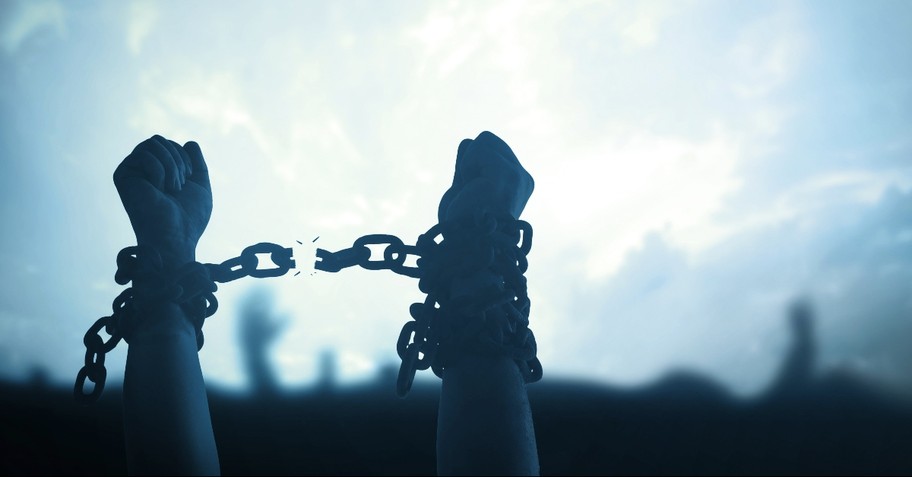5 Reasons It’s Hard for Christians to Forgive Ourselves and Others

“I won’t forgive. And I won’t forget.”
Like hot lava spewing from a live volcano, those confessions usually flow from a heart that’s been broken or crushed. Victims of violence, hatred, or even life’s accidental losses often have difficulty seeing beyond the hurt or the pain.
Who can blame them? No one wants to walk in their shoes. And no one wants to make heartache their best friend.
But what if that’s you? You’ve been wounded beyond repair, but the scars beg for healing. And no matter what anyone tells you, you feel as if no one and nothing can make it better. You know that bitterness can eat away like cancer when left alone, but it’s too hard—this thing called, “forgiveness.”
Or maybe you’re the one who needs forgiveness. And you can’t forgive yourself for a wrong committed, no matter how long ago it’s been. Shame has buried itself into the crevices of your heart, and the roots are too deep to unearth.
Professionals teach us that forgiveness is a process. And emotions take time to catch up with acceptance. But what makes it so hard for us as Christians to forgive ourselves and others? Here are five possible reasons:
Photo Credit: ©GettyImages/PeopleImages
1. We tend to categorize sin, even unconsciously.
In a list from one to ten, what tops your “unforgiveness” list? Murder? Betrayal? Corruption? Brutality? Or what about pride, deceit, neglect, or hypocrisy? Without a doubt, forgiveness is more difficult when that sin action affects us or our loved ones.
I wonder how Jesus would categorize sin.
Can you visualize Him as he observes a group of hypocritical leaders who have thrown an adulterous woman into the center of their circle? Jesus writes something in the dirt and makes one of those piercing statements He’s known for: Let any one of you who is without sin be the first to throw a stone at her” (John 8:7 NIV).
Silence.
Then, one by one, the men slink away, dropping their stones on the sandy terrain. I wonder what sins those stones represented? Big, little? Unforgivable (according to some)? But Jesus’ accusation answers the dilemma about how He or His Father categorizes sin.
And what about forgiveness? Jesus turns to the woman who stoops, hands covering her head, and He asks her, Woman, where are they? Has no one condemned you?” (John 8:10 NIV).
Slowly, she looks up and around, shaking her head, no.
Then neither do I condemn you,” Jesus declared. And Jesus, who grants her forgiveness, adds this command: “Go now and leave your life of sin” (John 8:11 NIV). I expect Jesus also implies the action of forgiving herself, as well as others.
2. We don’t understand the human heart.
We don’t understand the old nature of the heart and the one who wants to tempt us, just as he tempted Jesus in the wilderness. Even having received the new nature of a Christ-follower, we are still commanded to guard our hearts at all costs. The heart is deceitful above all things (Jeremiah 17:9). The one who thinks he can’t fall may inevitably do so.
That even happened to Jesus’ disciples, even though they spent three years of intensive teaching at the feet of Jesus. Like a Jewish Rabbi investing in the lives of his students and followers, He poured His life into them, training them from daylight to dark as disciples who would change the world with His message.
But Judas betrayed the Son of God. He never repented, so he abandoned the opportunity for forgiveness. And Peter wasn’t the only other disciple to turn away. Yes, he denied Jesus three times, contrary to the prideful ignorance of his own heart (Mark 14:72). But on the night of His betrayal, the other disciples ran and left Jesus alone too. No one stayed to help. And the only one of the 12 disciples mentioned at Jesus’ crucifixion was the beloved John, whom Jesus delegated with the care of His mother after His death.
The mind can point, even if our fingers don’t. “I would never…” has probably been spoken silently 70 X 7 times, as innumerable as our command from Jesus to forgive. We think we are above and exempt from a certain sinful behavior, that we would never be guilty of “that.” Pride makes us an easy target for our enemy. But understanding our own tendency to sin can help us see others—and forgiveness—in a new light.
The heart that is honest about its weakness will find power and strength in asking God’s Holy Spirit to stand guard in every temptation. And God can and will make a way. None of us are strong enough in our own power to withstand sin. That’s why Jesus died for us.
And what if we are the ones who can’t forgive ourselves? Who are we to declare “unforgivable” when God has already applied His grace to our sin, once and for all? Expecting perfection from ourselves will keep us in a deep rut of unforgiveness. Our spiritual growth is a process, too. But maybe our problem is, that we don’t really understand God’s heart or His grace.

3. We don’t understand our Father’s heart.
God created us for eternity and wants no one to die. Death was never His plan from the beginning, though He knew we would forfeit eternity for sin. And God’s plan for redemption was in place from the beginning. (John 1) But the Bible is His love story to us, showing us the way to find eternal life with Him after all. How?
Forgiveness. Even in the Old Testament, I love how our Father described Himself, as He passed by Moses, allowing the prophet to view only His back:
And he passed in front of Moses, proclaiming, “The Lord, the Lord, the compassionate and gracious God, slow to anger, abounding in love and faithfulness” (Exodus 34:6 NIV). Here is a picture of our Holy God, eager to offer compassion and forgiveness, even to those who hated Him.
John 3:16-17 reminds us what the Father’s heart was truly like:
For God so loved the world that he gave his one and only Son, that whoever believes in him shall not perish but have eternal life. For God did not send his Son into the world to condemn the world, but to save the world through him.
Not only did God send His Son, Jesus, into the world to take the penalty for our sin and to offer us complete forgiveness; I believe He also wanted Jesus to demonstrate His Father’s heart on earth in living color. He wanted us to know what the Father’s heart was like.
Photo Credit: ©GettyImages/Tinnakorn Jorruang / EyeEm
4. We don’t understand the magnitude of God’s grace.
Deitrich Bonhoeffer, in his book The Cost of Discipleship, reminds us that God’s grace is not cheap. It cost God His Son. But His grace is so powerful, giving us the desire to live for Jesus.
If you have been a Christ-follower for very long, you may unconsciously take the amazing story of Jesus’ death and resurrection for granted. Years ago, I asked my faithful Father to keep my gratitude fresh and my praise fluent, because of His grace and His sacrificial love for me. In answer to that prayer, I can honestly say He’s allowed numerous opportunities for the testing of my devotion—which included choosing forgiveness or unforgiveness. And at times I struggled like others.
Over twenty years ago, I began to read God’s Word daily noting the names, attributes, and activities of our triune God. I wanted to discover more about my faithful heavenly Father’s heart. The pattern of His unchangeable faithfulness, complete forgiveness, and unconditional love began to unravel like the thread of a well-worn sweater.
Through His Word, I discovered He was the Supplier for every need—not just one or two, but ALL our needs. And through His attributes, I uncovered needs in my heart—and in others—that I wasn’t even aware of. I found that He’s the One who gives us a fresh start, the One who keeps us on track, and the One Who reshapes our lives.
When we want to flip our failures, He’s the One who calls us forward, and when life doesn’t seem fair, He’s the One who is perfect and just. When you need someone to catch your tears, He’s the One who wipes away all tears, and when you’re feeling forgotten, He’s the One who will never forget you. I saw Him as Heart Mender, Thirst Quencher, Joy Filler, and Grace Giver.
Through my reading and studying of God’s Word, I wanted to help others discover our faithful Father’s heart too. So I wrote a book, recently released, called Day-votions® with Your Faithful Father, 90 Days with the One Who Can Meet All Your Needs. In that book, I tried to imagine, according to Scripture, what our faithful Father might say to you and me about His faithfulness to meet every need. In one chapter, here is how I visualized Jesus speaking to us personally about forgiveness, His Father’s heart, the magnitude of sin, and the magnitude of God’s grace:
My child, never call sin insignificant—something you can toss aside like the leftovers of an ordinary meal. The moment sin becomes ordinary, you’ve misplaced—and misunderstood—the impact of your sinful nature. I am the One who took your punishment. Sin corrupted every person and left them terminally ill apart from My intervention. And yet, look at My solution. I freed you and was crushed for your sins. On the day I was crucified, I took upon Myself every ugly sin ever committed. And, in earthly flesh, I received your chastisement that day so you could be healed. Can you ever forget the humiliation I experienced, the beatings I received, the nails I bore, and the unreal price I paid so you wouldn’t have to endure that kind of penalty? In this life, you will experience a measure of suffering, but not the forever kind of separation that would have sealed your fate forever, had I not stepped in. Then I rose again, destroying death’s sting forever! The magnitude of your sin was great. But always remember: My grace was greater.

5. We don’t understand the magnitude of sin.
How can we respond to that kind of grace? Here’s what I would say to the One who died for me:
Lord, where do I begin to thank You? You are the One who took my punishment! I’m the one who deserved to die. Words can never express what I feel. I can never fully repay the debt for my sin. Yet You don’t require payment from me. May I never forget the magnitude of my sin and the price of what You did for me, and what You do every day of my life. You forgave me. You released me from eternal imprisonment. You filled my heart with joy and You are giving me a full, abundant life. You gave me Your Holy Spirit to live in my heart daily. I am so grateful that the troubles and pressures of this life can never diminish Your love for me. My enemies have no power to steal or destroy my relationship with You. What amazing grace! You bless me and You are leading me on the path and in the plan You have designed for me. I will eternally thank You.¹
What the Bible Says about the Magnitude of Our Sin and God’s Grace
But it was our sins that did that to him, that ripped and tore and crushed him—our sins! He took the punishment, and that made us whole. Through his bruises we get healed. Isaiah 53:5 MSG
All have turned away, all have become corrupt; there is no one who does good, not even one. Psalm 14:3 NIV
All of us, like sheep, have strayed away. We have left God’s paths to follow our own. Yet the LORD laid on him the sins of us all. Isaiah 53:6 NLT
Can anything ever separate us from Christ’s love? Does it mean he no longer loves us if we have trouble or calamity, or are persecuted, or hungry, or destitute, or in danger, or threatened with death? Romans 8:35 NLT
He was sheer weakness and humiliation when he was killed on the Cross, but oh, he's alive now - in the mighty power of God! 2 Corinthians 13:4 MSG
Jesus said, “Father, forgive them, for they don’t know what they are doing.” Luke 23:34 NLT
Is It Easy to Forgive?
Is it easy to forgive others? No, because some offenses result in the kind of pain that will never be healed on this side of heaven. And even when justice is served, and an offender is punished, our hearts and minds won’t mend by themselves. We need a Healer. We need God’s grace.
But it can also be difficult to forgive ourselves. Your enemy wants to defeat you with the shame of your past. But it won’t last under the microscope of God’s amazing grace. God erases our shame, our sin, and our past, but never His forgiveness.
To the one who says, “I won’t forgive. And I won’t forget.” Remember this: God did both, for you, and for me:
“He has removed our sins as far from us as the east is from the west.” Psalm 102:12 NLT
“I—yes, I alone—will blot out your sins for my own sake and will never think of them again. Isaiah 43:25 NLT
Forgiveness is a choice. You won’t understand the magnitude of God’s grace until you realize the magnitude of your own sin. You will probably remember the sin, but you can’t erase God’s unconditional love and complete forgiveness.
Because He forgives us, we, too, can forgive.
¹Adapted from Day-votions with Your Faithful Father, 90 Days with the One Who Wants to Meet All Your Needs, ©2022, Rebecca Barlow Jordan, All Rights Reserved.
Photo Credit: ©iStock/Getty Images Plus/Boonyachoat
Originally published April 14, 2022.





